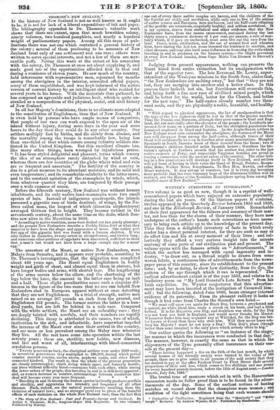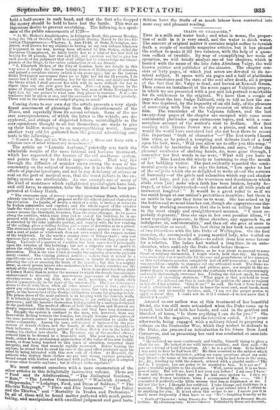WYNTER'S CURIOSITIES OF CIYMizsTION."
THIS volume is as good as new, though it is a reprint of well- remembered papers which have enjoyed an extensive popularity during the last six years. Of the thirteen papers it contains, twelve appeared in the Quarterly Review between 1855 and 1859, and one in the Edinburgh Review, of January 1860. Remarkable at their first appearance for the fulness and accuracy of their mat- ter, not less than for the charm of their manner, they have now undergone at the author's hands such corrections as were neces- sary to bring each article up to the knowledge of the present day. Thus they form a delightful inventory of facts in which every reader has a direct personal interest, for they are such as may or do affect him and his at every moment of their lives ; and col- lectively they afford a very curious insight into the minute anatomy of some parts of our civilization past and present. The volume opens with the famous article on " Advertisements," in which the author has managed with equal ingenuity and in- dustry, " to draw out, as a thread might be drawn from some woven fabric, a continuous lino of advertisements from the news- paper press of this country, since its establishment to the present time ; and, by so doing, to show how distinctly, from its dye, the pattern of the ago through which it ran is represented." The earliest advertisement extant is of the year 1652, and relates to a laudatory poem on "My Lord General's Late Return" from his Irish expedition. Dr. Wynter conjectures that this advertise- ment may have been inserted at the instigation of Cromwell him- self ; but the following, dated June 1660, bears stronger internal evidence of its paternity. From its pleasant raillery it looks as though it had come from Charles the Second's own hand- " We must call upon you again for Black Dog, between a greyhound and a spaniel, no white about him, onely a streak on his brest, and tayl a little bobbed. It is his Majesties own Dog, and doubtless was stoln, for the Dog was not barn nor bred in England, and would never forsake his Master. Whosoever finder him may acquaint any at Whitehal, for the Do" was bet- ter known at Court than those who stole him. Will they never leave rob- bing his Majesty ? must he not keep a Dog ? This Dog's place (though better than some imagine) is the only place which nobody offers to beg."
Our author quotes the following as "an instance of the singu- lar manner in which fire insurances were conducted in that day." The manner, however, is exactly the same as that in which the shipowners of the Tyne generally effect insurances on their ves- sels at the present day-
" There having happened a fire on the 24th of the last month, by which several houses of the friendly society were burned to the value of 965 pounds, these are to give notice to all persons of the said society that they are desired to pay at the office Faulcon Court in Fleet Street their several proportions of their said loss, which comes to five shillings and one penny for every hundred pounds insured, before the 12th of August neat.—Lesnoa Gazette, July 6th, 1685."
The brutal tone of manners which set in with .the Hanoverian succession needs no fuller proof than is to be found in the adver- tisements o£ the day. Some of the earliest notices of boxing matches on record show that the champions were women ; one condition of the fight sometimes being that each woman should
• Curiosities of Civilization. Reprinted from the "Quarterly" and "Edit).- burgh " Reviews. By Andrew Wynter, M.D. Published by Hardodeke.
hold a half-crown in each hand, and that the first who dropped the money should be held to have lost the battle. This was an ingenious device to prevent scratching. The following is a speci- men of the public amusements of 1728—
" At Mr. Stokes's Amphitheatre, h Islington Road, this present Monday, being the 7th of October, will be a complete Boxing Match by the two fol- lowing Championesses—irhereas, I, Ann Field; of Stoke Newington, ass- driver, Weil known for my abilities in-boxing in my own defence wherever it happened in my way, having been affronted by Mrs. Stokes, styled, the
'
European Championess do_do_fairly invite her to a trial of her best skill hr boxing for 10 pounds, fair rise and fall; and question not but to give her such proofs of my judgment that shall oblige her to acknowledge me Cham- pioness of the Stage, to the entire satisfaction of all my friends. "-I, Elizabeth Stokes; of the City of London, have not fought in this way since I fought the famous boxing-woman of Billingsgate 29 minutes; and gained a complete victory (which is six years ago); but as the famous Stoke Newington ass-woman dares me to fight her for the 10 pounds, I do assure her I will not fail meeting her for the said sum, and doubt not that the blows which I shall present her with will be more difficult for her to digest than any she over gave her asses. Ndte.—A man, known by the name of Rugged and Tuff, challenges the best man of Stoke Newington to fight him for one guinea to what sum they please to venture. N.B.—At- tendance will be given at one, and the encounter to begin at four precisely. There will he the diversion deudgel-playing as usual.
Coming down to our own day the article presents a very signi- ficant assortment of 'gleanings from the advertisements of the Times, and especially from its second column. Some of the se- cret correspondences, of which. the latter is the vehicle, are de- cyphered, and strings of disjointed letters, unintelligible as the comsponclents thought to all but themselves, are made to give up their hidden cleaning to an unsympathiziug world. Among another very-odd lot gathered from the general advertising con- tents is the following- " Wanted a Man and his Wife to look after a Horse and Dairy with a religious turn of mind without any ineumbrance."
The article on " Lunatic Asylums," pointedly sets forth the admirable results of the more rational and humane treatment, which has superseded the horrors of the old madhouse system, and points the way to further improvements. That way lies through the diffusion of sounder views amone° the mass of the community on the subject of insanity, for it is to the obstructive effects of popular ignorance, and not to any deficiency of science or zeal on the part of medical men, that the worst defects in the ex- isting system are attributable. As one example out of many of the kind of resistance which enlightened psychologists have had, and still have, to encounter, take the blunder that has been per- petrated at Colney Hatch.
" The enormous sum of money expended upon Caney Hatch, which has already reached to 270,0001., prepares us for the almost palatial character of its elevation. Its façade, of nearly a third of a mile, is broken at intervals by Italian campaniles and cupolas ; and the whole aspect of the exterior leads the visitor to expect an interior of commensurate pretensions. He no sooner crosses the threshold, however, than the scene changes. As he passes along the corridor, which runs from end to end of the building, he is op- pressed with the gloom ; the little light admitted by the loop-holed windows is absorbed by the-inky asphalte paving, and coupled with the low vaulting of the ceiling, gives a stiffing feeling and a sense of detention as in a prison. The staircases scarcely equal those of a workhouse ; plaster there is none, and a coat of paint or whitewash does not even conceal the rugged surface of the brickwork.. In the wards a similar state of things exists ; airy and spacious they are, without doubt ; but of human interest they possess no- thing. Upwards of a quarter of a million has been squandered principally upon the exterior of this building; but not a sixpence can be spared to adorn the walls within with picture, bust, or even the commonest cottage decoration. This is the vice which pervades the majority of county asylums lately erected. The visiting justices doubtless believe that it would be a superfluous and even mischievous refinement to trouble themselves about pleasing the eye or amusing the brain of the lunatic ; but this is a mighty error, as every person knows who understands how keenly sensitive are the
minds of the majority of the insane There is no more touching sight at Colney Hatch than to notice the manner in which the female lunatics have endeavoured to diversify the monotonous appearance of their cell-like sleeping-rooms with rag dolls, bits of shell, porcelain, or bright cloth placed symmetrically in the light of the window-sill. The love of ornament seems to dwell with them when all other mental power is lost ; and they
strew gay colours about them with no more senee, but with as much enjoy- ment, as the bower-bird of the Zoological Gardena adorns his playing-bower.
The prison dress of the male patients is in keeping with the desolate walls.
It is infinitely depressing, even to the visitor, to see nothing but dull grey garments ; and the lunatics themselves feel degraded by a uniform dedicated to the gaol-bird. The medical officers of both this asylum and Hanwell are deeply impressed with its injurious effects, and they have long denounced it. Happily the system is confined to the men, not, however, from any benevolent feeling towards the females, but simply because gown-pieces of the same pattern cannot be procured in sufficient quantities to clothe the entire community. Among the sane, self-respect is increased by the pos- session-of decent clothes, and the lunatic is often still more amenable to their influence. A refractory patient at Colney Hatch was in the habit of tearing his clothes into shreds. Mr, Tyerman, one of the medical officers, ordered him to bo dressed in a bran-new suit. The poor man, a tailor by
trade, either from a professional appreciation of the value of his new habili-
ments, or from being touched by this mark of attention, respected their integrity, and from that moment rapidly recovered. Before leaving the asylum, he stated that he owed his cure to the good effect produced upon his mind by being intrusted with this new suit of clothe,. At Hanwell, the patients who destroy their clothes are put into strong canvass garments, bound round with leather and fastened with padlocks. This plan is adopted at some other lunatic asylums ; but it always looks repulsive."
We must content ourselves with a mere enumeration of the other articles in this delightfully instructive volume. There are " Food and its Adulterations," "The ZoOlogical Gardens," " Rats," "The London Commissariat," "Woolwich Arsenal," "Shipwrecks," "Lodgings, Food, and Dress of Soldiers," " The Electric Telegraph," "Fires and Fire Insurance," "The Police and the Thieves," and " Mortality in Trades and Professions." In all of them will be found matter gathered with much pains- taking, and manipulated with excellent judgment and good taste. Seldom have the fruits of so much labour been converted into more easy and pleasant reading.



























 Previous page
Previous page